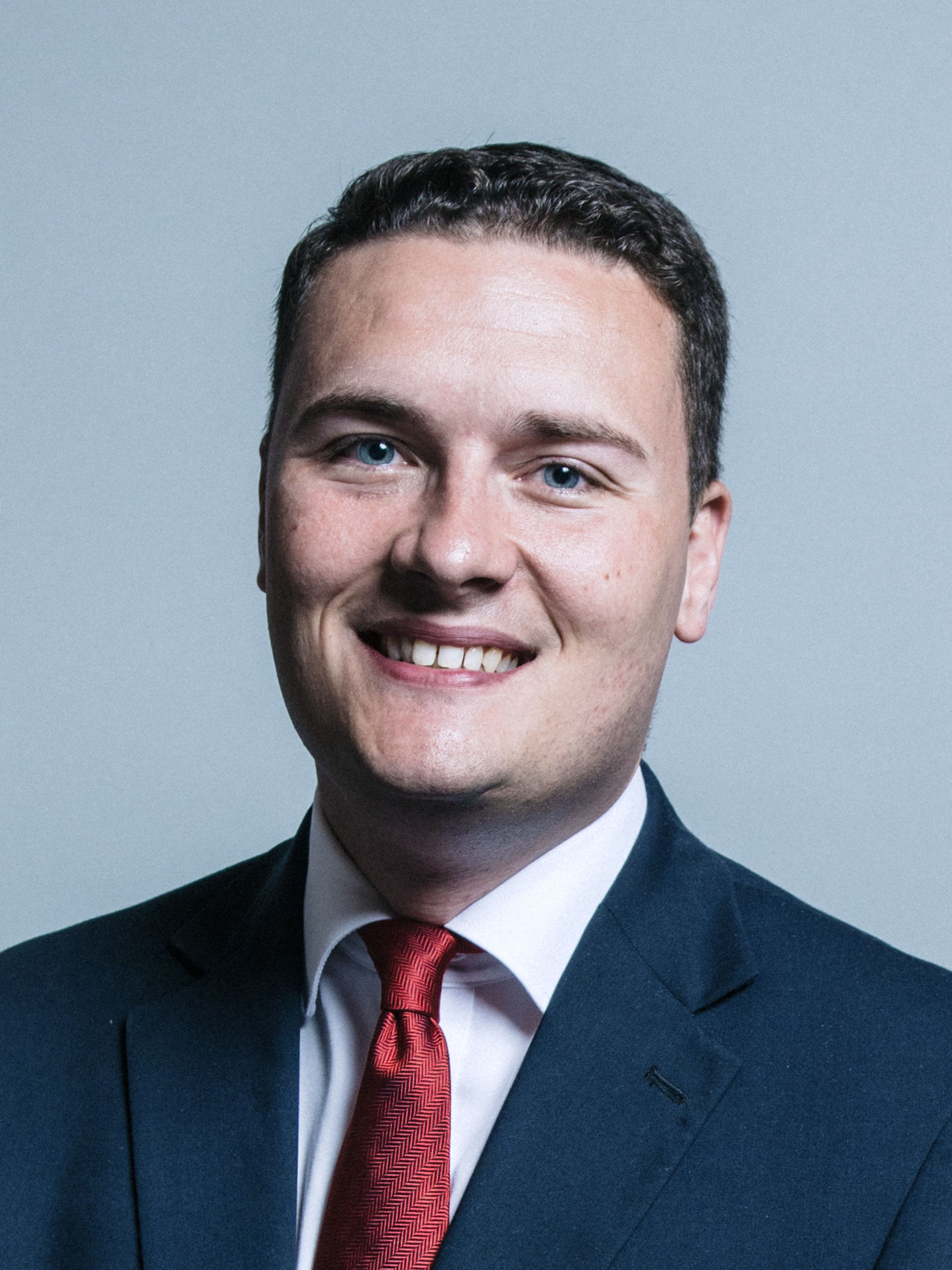Department of Health and Social Care
We support ministers in leading the nation’s health and social care to help people live more independent, healthier lives for longer.
Shadow Ministers / Spokeperson
Liberal Democrat
Helen Morgan (LD - North Shropshire)Liberal Democrat Spokesperson (Health and Social Care)
Danny Chambers (LD - Winchester)
Liberal Democrat Spokesperson (Mental Health)
Lord Scriven (LD - Life peer)
Liberal Democrat Lords Spokesperson (Health)
Scottish National Party
Seamus Logan (SNP - Aberdeenshire North and Moray East)Shadow SNP Spokesperson (Health and Social Care)
Green Party
Adrian Ramsay (Green - Waveney Valley)Green Spokesperson (Health)
Conservative
Stuart Andrew (Con - Daventry)Shadow Secretary of State for Health and Social Care
Junior Shadow Ministers / Deputy Spokesperson
Conservative
Lord Kamall (Con - Life peer)Shadow Minister (Health and Social Care)
Caroline Johnson (Con - Sleaford and North Hykeham)
Shadow Minister (Health and Social Care)
Junior Shadow Ministers / Deputy Spokesperson
Conservative
Luke Evans (Con - Hinckley and Bosworth)Shadow Parliamentary Under Secretary (Health and Social Care)
Ministers of State
Stephen Kinnock (Lab - Aberafan Maesteg)Minister of State (Department of Health and Social Care)
Karin Smyth (Lab - Bristol South)
Minister of State (Department of Health and Social Care)
Parliamentary Under-Secretaries of State
Baroness Merron (Lab - Life peer)Parliamentary Under-Secretary (Department of Health and Social Care)
Ashley Dalton (Lab - West Lancashire)
Parliamentary Under-Secretary (Department of Health and Social Care)
Zubir Ahmed (Lab - Glasgow South West)
Parliamentary Under-Secretary (Department of Health and Social Care)
16:00
Correspondence
The Committee is holding an inquiry into what is needed from the NHS estate to deliver the Government’s vision of …
To ask the Secretary of State for Health and Social Care, whether he has made recent progress on developing national …
These Regulations amend the National Institute for Health and Care Excellence (Constitution and Functions) and NHS England (Functions) Regulations 2013 …
A Bill to Make provision about the prioritisation of graduates from medical schools in the United Kingdom and certain other …
00:15
News and Communications
Department of Health and Social Care Commons Appearances
Oral Answers to Questions is a regularly scheduled appearance where the Secretary of State and junior minister will answer at the Dispatch Box questions from backbench MPs
Other Commons Chamber appearances can be:- Urgent Questions where the Speaker has selected a question to which a Minister must reply that day
- Adjornment Debates a 30 minute debate attended by a Minister that concludes the day in Parliament.
- Oral Statements informing the Commons of a significant development, where backbench MP's can then question the Minister making the statement.
Westminster Hall debates are performed in response to backbench MPs or e-petitions asking for a Minister to address a detailed issue
Written Statements are made when a current event is not sufficiently significant to require an Oral Statement, but the House is required to be informed.
Most Recent Commons Appearances by Category
Bills currently before Parliament
Department of Health and Social Care does not have Bills currently before Parliament
Acts of Parliament created in the 2024 Parliament
A Bill to make provision to amend the Mental Health Act 1983 in relation to mentally disordered persons; and for connected purposes.
This Bill received Royal Assent on 18th December 2025 and was enacted into law.
Department of Health and Social Care - Secondary Legislation
Petitions
e-Petitions are administered by Parliament and allow members of the public to express support for a particular issue.
If an e-petition reaches 10,000 signatures the Government will issue a written response.
If an e-petition reaches 100,000 signatures the petition becomes eligible for a Parliamentary debate (usually Monday 4.30pm in Westminster Hall).
(16,123 in the last 7 days)
(4,645 in the last 7 days)
(3,200 in the last 7 days)
(2,688 in the last 7 days)
(1,836 in the last 7 days)
(165 in the last 7 days)
(895 in the last 7 days)
(270 in the last 7 days)
(384 in the last 7 days)
(16,123 in the last 7 days)
Petition Closed
Increase funding for people with Parkinson’s and implement the "Parky Charter"
Gov Responded - 29 Apr 2025closed 5 months, 3 weeks ago
We want the government to take the decisive five steps set out in the Movers and Shakers' "Parky Charter" and to fulfil the Health Secretary’s promises.
Departmental Select Committee
Health and Social Care Committee
Commons Select Committees are a formally established cross-party group of backbench MPs tasked with holding a Government department to account.
At any time there will be number of ongoing investigations into the work of the Department, or issues which fall within the oversight of the Department. Witnesses can be summoned from within the Government and outside to assist in these inquiries.
Select Committee findings are reported to the Commons, printed, and published on the Parliament website. The government then usually has 60 days to reply to the committee's recommendations.
11 Members of the Health and Social Care Committee

Health and Social Care Committee Member since 9th September 2024

Health and Social Care Committee Member since 21st October 2024

Health and Social Care Committee Member since 21st October 2024

Health and Social Care Committee Member since 21st October 2024

Health and Social Care Committee Member since 21st October 2024

Health and Social Care Committee Member since 21st October 2024

Health and Social Care Committee Member since 21st October 2024

Health and Social Care Committee Member since 21st October 2024

Health and Social Care Committee Member since 21st October 2024

Health and Social Care Committee Member since 28th October 2024

Health and Social Care Committee Member since 17th March 2025
Health and Social Care Committee: Upcoming Events
4 Mar 2026, 9 a.m.
View calendar - Save to Calendar
Health and Social Care Committee: 9 Current Inquiries
Health and Social Care Committee: Previous Inquiries
50 most recent Written Questions
(View all written questions)The Innovative Medicines Fund (IMF), established in June 2022, provides time‑limited access to innovative non‑cancer medicines while further evidence is generated to address uncertainties identified by the NICE appraisal committee. Following a managed access period of up to five years, NICE reviews the updated evidence to determine whether the medicine should be routinely commissioned by the NHS.
NHS England spent £2 million on drugs funded through the IMF in both 2023/24 and 2024/25. This is 0.6% of the £340 million allocated to the IMF.
In the 2025/26 financial year to date, IMF expenditure has been £18 million, 5.3% of allocated funds. Any underspend on medicines funded through the IMF is diverted to other specialised services.
Parliamentary Under-Secretary (Department of Health and Social Care)
The Department of Health and Social Care has indicated that it will not be possible to answer this question within the usual time period. An answer is being prepared and will be provided as soon as it is available.
Minister of State (Department of Health and Social Care)
The Department of Health and Social Care has indicated that it will not be possible to answer this question within the usual time period. An answer is being prepared and will be provided as soon as it is available.
Parliamentary Under-Secretary (Department of Health and Social Care)
The Department of Health and Social Care has indicated that it will not be possible to answer this question within the usual time period. An answer is being prepared and will be provided as soon as it is available.
Minister of State (Department of Health and Social Care)
The Department of Health and Social Care has indicated that it will not be possible to answer this question within the usual time period. An answer is being prepared and will be provided as soon as it is available.
Mary Glindon
(Labour - Newcastle upon Tyne East and Wallsend)
The Department of Health and Social Care has indicated that it will not be possible to answer this question within the usual time period. An answer is being prepared and will be provided as soon as it is available.
Minister of State (Department of Health and Social Care)
The Department of Health and Social Care has indicated that it will not be possible to answer this question within the usual time period. An answer is being prepared and will be provided as soon as it is available.
Parliamentary Under-Secretary (Department of Health and Social Care)
The Department of Health and Social Care has indicated that it will not be possible to answer this question within the usual time period. An answer is being prepared and will be provided as soon as it is available.
Minister of State (Department of Health and Social Care)
There are no plans to publish an impact assessment or details of the modelling in relation to changes to the National Institute for Health and Care Excellence cost-effectiveness threshold. Information included in the impact assessment is commercially sensitive.
The United Kingdom and United States’ pharmaceutical deal is a vital investment that builds on the strength of our National Health Service and world leading life sciences sector.
Parliamentary Under-Secretary (Department of Health and Social Care)
National Health Service organisations must ensure all patients have equitable access to care, and that decisions or policies do not unfairly disadvantage people or lead to an increase in inequalities. All NHS organisations are legally obliged to not discriminate.
This means that although we promote digital first services to those who choose to use them, a non-digital solution should be available for those patients who cannot or do not wish to engage digitally, which may include elderly people, to ensure continued, equitable access to care.
These non-digital routes must be available for all services provided by NHS organisations.
Parliamentary Under-Secretary (Department of Health and Social Care)
Under the Down Syndrome Act, my Rt Hon. Friend, the Secretary of State for Health and Social Care, is required to give statutory guidance to relevant authorities in health, social care, education, and housing services on what they should be doing to meet the needs of people with Down syndrome. The consultation on the draft guidance was launched on 5 November 2025 and will remain open until 30 March 2026.
The draft guidance has been informed by over 1,500 responses to the call for evidence in 2022. A summary of these findings was published on 5 November 2025. In developing the draft guidance, the Department for Health and Social Care engaged with NHS England and all relevant Government departments, including the Department for Education. Officials also engaged with people with Down syndrome and those with other conditions and/or a learning disability who have similar needs, and their parents and carers, as well as experts and practitioners from multiple sectors, to ensure the guidance is robust, evidence-based and fit for purpose.
Based on what we were told during the call for evidence and subsequent engagement, a needs profile paper has also been developed which sets out the specific needs of people with Down syndrome. The needs paper, which has been published alongside the consultation, was used to inform the development of the draft guidance.
Parliamentary Under-Secretary (Department of Health and Social Care)
Integrated care boards (ICBs) are responsible for the provision and commissioning of services to meet the needs of their local populations, including services for non-hearing children.
Auditory verbal therapy (AVT) is one type of therapy to support children with hearing loss, and it is important that local commissioners have the discretion to decide how best to meet the needs of their local population, informed by the best available evidence and guidance.
NHS England supports ICBs to make informed decisions about the provision of audiology services so that they can provide consistent, high quality, and integrated care. In November 2025, NHS England appointed two national specialty advisers for hearing and associated conditions who are considering care pathway improvements for hearing services. Based on consideration of the current evidence on AVT, NHS England has no plans to develop such national guidance.
The National Institute for Health and Care Excellence’s (NICE) prioritisation board considered childhood hearing loss as a potential guideline topic in August 2024. NICE concluded that there is limited evidence available in this area and that the 2015 NHS England Action Plan on Hearing Loss and guidance issued in 2019 addresses care for this population. It is understood that Auditory Verbal UK are in the process of developing the evidence base for the intervention. The NHS England Action Plan on Hearing Loss is available at the following link:
https://www.england.nhs.uk/wp-content/uploads/2015/03/act-plan-hearing-loss-upd.pdf
Parliamentary Under-Secretary (Department of Health and Social Care)
In 2023, NHS England produced a guide for frontline staff to support people with learning disabilities which asks staff to be aware of diagnostic overshadowing. NHS England does not hold data on the extent of diagnostic overshadowing for people with Down syndrome, nor is the data held centrally. This guide is available at the following link:
Through the implementation of the Down Syndrome Act 2022, the Government is striving to improve life outcomes for people with Down syndrome, raise awareness and understanding of their needs, and break down barriers to opportunity that they, and other disabled people, face.
Under the Down Syndrome Act, the Secretary of State for Health and Social Care is required to give guidance to relevant authorities in health, social care, education and housing services on what they should be doing to support the needs of people with Down syndrome. The draft guidance, which was published for public consultation on 5 November 2025, acknowledges that many people with Down syndrome may experience diagnostic overshadowing and recognises its impact on the care and treatment that people receive.
The Department welcomes specific suggestions of other topics for inclusion or additional detail on those already covered through the consultation. Once the consultation has closed, the Government will consider all consultation responses to inform the final guidance to be published.
Parliamentary Under-Secretary (Department of Health and Social Care)
I refer the Rt Hon. Member to the answer I gave to the Hon. Member for Maidenhead on 5 January 2026 to Question 103131.
Parliamentary Under-Secretary (Department of Health and Social Care)
Following the abolition of local Healthwatch, our proposals are that integrated care boards (ICBs) and local authorities (LAs) will have the responsibility for gathering views, and feedback from local people about health and social care services respectively in their area.
ICBs and LAs will be required to take these views into account when looking at their commissioning strategies to ensure these meet the needs of local people. They will also be required to demonstrate that they have done so.
However, these proposals require primary legislation. The timing of this is subject to the will of Parliament and will happen when parliamentary time allows.
Parliamentary Under-Secretary (Department of Health and Social Care)
As set out in the Life Sciences Sector Plan, we will build on our programme of national public engagement on the use of health data and work with the system, including clinical staff, to move towards national and regional models of decision making for access to all National Health Service data for secondary uses, for instance data used for purposes beyond an individual’s care, for example planning NHS services and research. We will use a combination of policy and legislative change to implement this and speed up secure access to this data. This may result in changes to data controllership responsibilities for secondary uses of data.
General practices (GPs) would remain data controllers for data in GP records for an individual’s care.
Parliamentary Under-Secretary (Department of Health and Social Care)
The Employment Rights Act 1996 aims to protect all workers, including National Health Service staff, against unfair dismissal and detriment on the basis that they have made a ‘protected disclosure’. Where detriment occurs, workers can seek remedy through an employment tribunal. In relation to sexual misconduct, the Employment Rights Act 2025 amends the Employment Rights Act 1996 to make clear that workers who ‘blow the whistle’ on sexual harassment can benefit from whistleblowing protections against detriment and unfair dismissal. This will provide welcome clarity for workers and employers. It may also encourage more workers to speak up about sexual harassment in the public interest by using whistleblowing routes. The measure will commence on 6 April 2026.
In addition to legal protections, there is a range of support in place for NHS workers who wish to report concerns. This includes a network of over 1,300 local Freedom to Speak Up Guardians, who provide an alternative route to support workers to speak up about something in their organisation, a National Freedom to Speak Up policy, providing minimum standards for local NHS speaking up policies, and support from independent organisations such as Speak Up Direct, which provides NHS and social care workers with impartial advice and support.
Parliamentary Under-Secretary (Department of Health and Social Care)
The Government welcomes the COVID-19 Inquiry’s investigations and is committed to learning lessons from the pandemic, including those relating to the potential impact on children’s mental health and wellbeing. We continue to respond openly and transparently to the inquiry’s requests and reports, and will be paying close attention to the Module 8 report, Children and Young People, and the Module 10 report, Impact on Society, which will cover mental health and wellbeing. Whilst we wait for these reports, the Department is already embedding mental health considerations into pandemic preparedness planning.
In 2019, the UK Chief Medical Officers published a commentary on the findings of a systematic review on screen-based activities and children’s mental health. They found an association between screen-based activities and mental health but could not establish causality. The commentary can be accessed at the following link:
On 2 March 2026, the Government published a consultation on how to ensure children have a healthy relationship with devices, introduce rapid trials on measures to reduce screentime and limit access at night, and produce evidence-informed screentime guidance for parents of children aged five to 16 years old. The consultation can be accessed at the following link:
https://www.gov.uk/government/consultations/growing-up-in-the-online-world-a-national-consultation
Parliamentary Under-Secretary (Department of Health and Social Care)
The Department has not specifically attempted to estimate the full costs to the National Health Service of preventable stoma management or the merits of introducing a nationally mandated annual specialist stoma review requirement within the NHS Standard Contract. However, as part of work linked to reforms of Part IX of the Drug Tariff, the Department is aware that patient experience varies, and through NHS England, is currently reviewing the provision of stoma products and stoma services.
The Department does not hold data on variation between integrated care systems (ICS) in access to specialist stoma review and structured follow-up. However, through this work NHS England has been engaging ICSs to understand what impacts stoma care and to identify improvements.
Parliamentary Under-Secretary (Department of Health and Social Care)
The Department has not specifically attempted to estimate the full costs to the National Health Service of preventable stoma management or the merits of introducing a nationally mandated annual specialist stoma review requirement within the NHS Standard Contract. However, as part of work linked to reforms of Part IX of the Drug Tariff, the Department is aware that patient experience varies, and through NHS England, is currently reviewing the provision of stoma products and stoma services.
The Department does not hold data on variation between integrated care systems (ICS) in access to specialist stoma review and structured follow-up. However, through this work NHS England has been engaging ICSs to understand what impacts stoma care and to identify improvements.
Parliamentary Under-Secretary (Department of Health and Social Care)
The Department has not specifically attempted to estimate the full costs to the National Health Service of preventable stoma management or the merits of introducing a nationally mandated annual specialist stoma review requirement within the NHS Standard Contract. However, as part of work linked to reforms of Part IX of the Drug Tariff, the Department is aware that patient experience varies, and through NHS England, is currently reviewing the provision of stoma products and stoma services.
The Department does not hold data on variation between integrated care systems (ICS) in access to specialist stoma review and structured follow-up. However, through this work NHS England has been engaging ICSs to understand what impacts stoma care and to identify improvements.
Parliamentary Under-Secretary (Department of Health and Social Care)
As set out in the Dash Review of the patient safety landscape published in July 2025, and in the 10-Year Health Plan, the statutory functions of local Healthwatch bodies will be transferred to integrated care boards (ICBs) for health, and to local authorities (LAs) for social care.
Both ICBs and LAs will be required to demonstrate how they have gathered patient and user feedback from local people including those who do not have access to digital platforms, those who are less proficient with technology, and people for whom English is a second language.
Parliamentary Under-Secretary (Department of Health and Social Care)
We acknowledge that the confidence to report sexual misconduct in the National Health Service remains a systemic challenge that is influenced by a range of factors.
For example, NHS staff often do not wish to subject themselves to a formal employment process or are concerned about reprisals from other members of staff or believe they may not be taken seriously by their manager and organisation.
All trusts and integrated care boards (ICBs) have signed up to the NHS Sexual Safety Charter, which is available at the following link:
https://www.england.nhs.uk/publication/sexual-safety-in-healthcare-organisational-charter/
The principles underpinning the charter contribute to improving workplace sexual safety culture, which should empower more staff to speak up.
In 2024, NHS England produced a national policy framework for sexual misconduct. The framework recommends routes through which reports can be made including Freedom to Speak Up Guardians, line managers, human resources, or via an anonymous reporting form. Every trust and ICB now has a policy in place or is in the process of adopting one, and 76% have implemented anonymous reporting for staff.
The Patient Advice and Liaison service and complaints system provide routes for patients and the public to report incidents of sexual misconduct.
In December 2025, NHS England wrote to NHS trusts and ICBs setting out further actions to take to ensure the sexual safety of both patients and staff. Further information is available at the following link:
https://www.england.nhs.uk/long-read/an-update-on-actions-to-prevent-sexual-misconduct-in-the-nhs/
Parliamentary Under-Secretary (Department of Health and Social Care)
The Department funds research through the National Institute for Health and Care Research (NIHR) including research into chronic pain disorders. Between 2020/21 and 2024/25, the NIHR invested £39.4 million in direct research funding in this area. Further information on that research can be seen at the following link:
https://nihr.opendatasoft.com/pages/homepage/
The NIHR provides an online service called Be Part of Research, which promotes participation in health and social care research by allowing users to search for relevant studies and register their interest. At the current time, there are 41 studies actively recruiting for participants on many aspects of chronic pain. Further information is available at the following link:
https://bepartofresearch.nihr.ac.uk/results/search-results?query=chronic%20pain&location=
The NIHR’s infrastructure also provides support for the country’s leading experts to develop and deliver high-quality translational, clinical, and applied research that is funded by the NIHR’s research programmes, other public funders of research, charities, and the life sciences industry, including many aspects of chronic pain. Further information is available at the following link:
Parliamentary Under-Secretary (Department of Health and Social Care)
Pharmacists are highly trained and skilled healthcare professionals. As part of dispensing medicines, pharmacists have a professional responsibility to inform patients about the medicines they are taking, and this may include mentioning any ingredients in the medicines based on any allergies or intolerances that the patient reports. Where a potential issue is identified, pharmacists can contact the prescriber to request an alternative medicine or recommend a different formulation or brand of medicine where appropriate.
NHS England has made changes to enable pharmacists to access patient records when delivering clinical services such as Pharmacy First. This means pharmacists can view any known allergies or intolerances that are included in a patient’s record and use their professional and clinical judgement to supply medicines appropriate for the patient’s allergy or intolerance.
Minister of State (Department of Health and Social Care)
There were three statutory and non-statutory inquiries into National Health Service trusts and care trusts commissioned by the Department in the 2025/26 financial year. The average cost per inquiry over this period is approximately £4.3 million.
Parliamentary Under-Secretary (Department of Health and Social Care)
The Department monitors and manages medicine supply at a national level so that stocks remain available to meet regional and local demand.
The Department is aware of a recent disruption to the supply of aspirin tablets due to manufacturing issues and knock-on increased demand. The issues have been addressed, and we are working with suppliers to aid a return to normal supply as soon as possible, with stock regularly being made available for pharmacies to order. Guidance has been issued to healthcare professionals with management advice to consider until the supply issue fully resolves.
We are working with all partners in the supply chain, including manufacturers and United Kingdom distributors, to ensure maximum accessibility to pharmacies and hospitals irrespective of where they are in the country.
The Department will continue to monitor the situation and expects supplies to return to normal over the coming weeks.
Parliamentary Under-Secretary (Department of Health and Social Care)
The Department monitors and manages medicine supply at a national level so that stocks remain available to meet regional and local demand.
The Department is aware of a recent disruption to the supply of aspirin tablets due to manufacturing issues and knock-on increased demand. The issues have been addressed, and we are working with suppliers to aid a return to normal supply as soon as possible, with stock regularly being made available for pharmacies to order. Guidance has been issued to healthcare professionals with management advice to consider until the supply issue fully resolves.
We are working with all partners in the supply chain, including manufacturers and United Kingdom distributors, to ensure maximum accessibility to pharmacies and hospitals irrespective of where they are in the country.
The Department will continue to monitor the situation and expects supplies to return to normal over the coming weeks.
Parliamentary Under-Secretary (Department of Health and Social Care)
We have reached a landmark agreement with the United States of America, which means, unlike anywhere else in the world, life sciences companies exporting medicines from the United Kingdom to the US will face no tariffs to do so, protecting jobs and investment in the UK. This gives the UK a competitive advantage when selling to the global market, and the changes we’re making to increase what we spend on medicines will therefore help UK companies to export to the US, and shores up the investments global players have made in the UK, whilst also attracting further investments.
No assessment has been made of the potential impact of zero tariffs on pharmaceuticals exports from the UK to the US on the South Suffolk constituency.
No assessment has been made of the potential impact of zero tariffs being applied to pharmaceuticals exports from the UK into the US on National Health Service spending on medicines. The overall US agreement is expected to cost approximately £1 billion over the course of the Spending Review.
Parliamentary Under-Secretary (Department of Health and Social Care)
We have reached a landmark agreement with the United States of America, which means, unlike anywhere else in the world, life sciences companies exporting medicines from the United Kingdom to the US will face no tariffs to do so, protecting jobs and investment in the UK. This gives the UK a competitive advantage when selling to the global market, and the changes we’re making to increase what we spend on medicines will therefore help UK companies to export to the US, and shores up the investments global players have made in the UK, whilst also attracting further investments.
No assessment has been made of the potential impact of zero tariffs on pharmaceuticals exports from the UK to the US on the South Suffolk constituency.
No assessment has been made of the potential impact of zero tariffs being applied to pharmaceuticals exports from the UK into the US on National Health Service spending on medicines. The overall US agreement is expected to cost approximately £1 billion over the course of the Spending Review.
Parliamentary Under-Secretary (Department of Health and Social Care)
The Medicines and Healthcare products Regulatory Agency (MHRA) and the National Institute for Health and Care Excellence (NICE) are working to deliver the Government’s ambitions, as set out in the 10-Year Health Plan for England and the Life Sciences Sector Plan, to streamline regulation and market access. This closer collaboration will enable parallel decisions on licensing and value, reducing time to patient access by three to six months.
NICE’s established health technology appraisal processes allow a range of evidence to be considered, and tumour‑agnostic therapies such as pembrolizumab, reference code TA914, have already been licensed and recommended for National Health Service patients. Further treatments are expected to progress through aligned MHRA and NICE pathways.
The Department has commissioned the Royal College of Radiologists to review multidisciplinary team (MDT) working, focusing on practical actions to improve efficiency and speed access to treatment. The review will report in summer 2026, with new guidance to follow in spring 2027.
To improve outcomes for people with rare cancers, Cancer Alliances will assess variation in treatment pathways, including access to specialist MDTs, to support more consistent care and greater use of expertise in centres of excellence. Prescribers remain responsible for treatment decisions, working with patients and using relevant evidence and guidance. Clinicians may prescribe medicines off‑label where this is in the patient’s best interests and subject to local NHS funding arrangements.
Parliamentary Under-Secretary (Department of Health and Social Care)
The Medicines and Healthcare products Regulatory Agency (MHRA) and the National Institute for Health and Care Excellence (NICE) are working to deliver the Government’s ambitions, as set out in the 10-Year Health Plan for England and the Life Sciences Sector Plan, to streamline regulation and market access. This closer collaboration will enable parallel decisions on licensing and value, reducing time to patient access by three to six months.
NICE’s established health technology appraisal processes allow a range of evidence to be considered, and tumour‑agnostic therapies such as pembrolizumab, reference code TA914, have already been licensed and recommended for National Health Service patients. Further treatments are expected to progress through aligned MHRA and NICE pathways.
The Department has commissioned the Royal College of Radiologists to review multidisciplinary team (MDT) working, focusing on practical actions to improve efficiency and speed access to treatment. The review will report in summer 2026, with new guidance to follow in spring 2027.
To improve outcomes for people with rare cancers, Cancer Alliances will assess variation in treatment pathways, including access to specialist MDTs, to support more consistent care and greater use of expertise in centres of excellence. Prescribers remain responsible for treatment decisions, working with patients and using relevant evidence and guidance. Clinicians may prescribe medicines off‑label where this is in the patient’s best interests and subject to local NHS funding arrangements.
Parliamentary Under-Secretary (Department of Health and Social Care)
The Medicines and Healthcare products Regulatory Agency (MHRA) and the National Institute for Health and Care Excellence (NICE) are working to deliver the Government’s ambitions, as set out in the 10-Year Health Plan for England and the Life Sciences Sector Plan, to streamline regulation and market access. This closer collaboration will enable parallel decisions on licensing and value, reducing time to patient access by three to six months.
NICE’s established health technology appraisal processes allow a range of evidence to be considered, and tumour‑agnostic therapies such as pembrolizumab, reference code TA914, have already been licensed and recommended for National Health Service patients. Further treatments are expected to progress through aligned MHRA and NICE pathways.
The Department has commissioned the Royal College of Radiologists to review multidisciplinary team (MDT) working, focusing on practical actions to improve efficiency and speed access to treatment. The review will report in summer 2026, with new guidance to follow in spring 2027.
To improve outcomes for people with rare cancers, Cancer Alliances will assess variation in treatment pathways, including access to specialist MDTs, to support more consistent care and greater use of expertise in centres of excellence. Prescribers remain responsible for treatment decisions, working with patients and using relevant evidence and guidance. Clinicians may prescribe medicines off‑label where this is in the patient’s best interests and subject to local NHS funding arrangements.
Parliamentary Under-Secretary (Department of Health and Social Care)
Integrated care board (ICBs) are responsible for commissioning primary care services, including National Health Service dentistry, to meet the needs of the local population. For the Slough constituency, this is the Frimley ICB.
The Government is committed to ensuring people can access urgent dental care when they need it. Over the past year, ICBs have been commissioning additional urgent dental appointments and there is now an urgent care safety net available in all areas of the country. We are broadening the scope of the commitment to deliver additional appointments so that they can be used for more patients, not just those who meet the clinical criteria for “urgent” care.
We are committed to delivering fundamental reform of the dental contract before the end of this Parliament. As a first step, on 16 December we published the Government’s response to the public consultation on quality and payment reforms to the NHS dental contract. The changes will be introduced from April 2026. These reforms will put patients with greatest need first, incentivising urgent care and complex treatments. Further information is available at the following website:
Minister of State (Department of Health and Social Care)
We recognise the challenges in accessing general practices (GPs). That’s why we are expanding capacity across England, including in Slough. Since October 2024, we have invested £160 million into the Additional Roles Reimbursement Scheme to support recruitment of over 2,000 GPs, exceeding our initial target of 1,000. Changes in the 2025/26 contract have also removed restrictions so individual primary care networks can hire more GPs.
We are also introducing a practice‑level GP reimbursement scheme, worth £292 million, enabling practices to hire additional GPs or fund extra GP sessions. This will improve access, boost capacity, and support GP employment.
Slough sits within the NHS Frimley Integrated Care Board, where the number of appointments delivered in GPs has increased by 6.7%, rising from 358,000 in December 2024 to 382,000 in December 2025.
Minister of State (Department of Health and Social Care)
There are currently no dental schools in Nottingham, Nottinghamshire, or the East Midlands. Consequently, no dental students have undertaken undergraduate training in Nottingham, Nottinghamshire, or the East Midlands. The following table shows the number of entrants to undergraduate dentistry courses in England from 2012 to 2025:
Year of Entry | Entrants |
2012 | 875 |
2013 | 875 |
2014 | 800 |
2015 | 780 |
2016 | 800 |
2017 | 805 |
2018 | 810 |
2019 | 810 |
2020 | 895 |
2021 | 980 |
2022 | 815 |
2023 | 815 |
2024 | 830 |
2025 | 815 |
Source: Office for Students Medical and Dental Students Survey.
Note: data for 2025 is provisional as entrants are based on initial figures and may change.
Minister of State (Department of Health and Social Care)
The Government is committed to ensuring that people approaching the end of life receive high-quality, compassionate care whenever it is needed.
Urgent community response (UCR) services play a key role in this. UCR provides a two-hour community-based response to adults experiencing a sudden deterioration in their health and helps avoid unnecessary hospital admissions. People at the end of life are among those who can be referred into UCR services for urgent crisis, for symptom control and/or pain relief, in line with a person’s wishes.
We are committed to improving the consistency, capacity, and availability of UCR services across England. The Urgent and Emergency Care Delivery Plan 2025/26 includes actions to expand urgent care delivered in the community, including UCR, and the National Health Service 10-Year Health Plan further commits to increasing access to urgent care at home and in the community as part of the new Neighbourhood Health model.
Additionally, NHS England’s published statutory guidance on palliative care and end-of-life care states that integrated care boards, as commissioning authorities, must define how their local service providers meet population needs on a 24/7 basis.
The National Institute for Health and Care Excellence (NICE) guideline, NG142: End of life care for adults: service delivery, also recommends that adults nearing the end of life have access to a healthcare professional 24 hours a day, seven days a week, as well as an out-of-hours advice line and access to essential medicines for symptom management.
Although NICE guidance is not mandatory, there is an expectation that commissioners and service providers take the guidelines into account when making decisions about how to best meet the needs of their local communities.
Furthermore, to strengthen provision for people at the end of life, we will publish a Palliative Care and End-of-Life Care Modern Service Framework (MSF) later this year. Through our MSF, we will closely monitor the shift towards the strategic commissioning of palliative care and end-of-life care services to ensure that services reduce variation in access and quality, including strengthening out-of-hours community health support, dedicated telephone advice, and overall consideration of 24/7 provision.
Minister of State (Department of Health and Social Care)
The Government is committed to ensuring that people approaching the end of life receive high-quality, compassionate care whenever it is needed.
Urgent community response (UCR) services play a key role in this. UCR provides a two-hour community-based response to adults experiencing a sudden deterioration in their health and helps avoid unnecessary hospital admissions. People at the end of life are among those who can be referred into UCR services for urgent crisis, for symptom control and/or pain relief, in line with a person’s wishes.
We are committed to improving the consistency, capacity, and availability of UCR services across England. The Urgent and Emergency Care Delivery Plan 2025/26 includes actions to expand urgent care delivered in the community, including UCR, and the National Health Service 10-Year Health Plan further commits to increasing access to urgent care at home and in the community as part of the new Neighbourhood Health model.
Additionally, NHS England’s published statutory guidance on palliative care and end-of-life care states that integrated care boards, as commissioning authorities, must define how their local service providers meet population needs on a 24/7 basis.
The National Institute for Health and Care Excellence (NICE) guideline, NG142: End of life care for adults: service delivery, also recommends that adults nearing the end of life have access to a healthcare professional 24 hours a day, seven days a week, as well as an out-of-hours advice line and access to essential medicines for symptom management.
Although NICE guidance is not mandatory, there is an expectation that commissioners and service providers take the guidelines into account when making decisions about how to best meet the needs of their local communities.
Furthermore, to strengthen provision for people at the end of life, we will publish a Palliative Care and End-of-Life Care Modern Service Framework (MSF) later this year. Through our MSF, we will closely monitor the shift towards the strategic commissioning of palliative care and end-of-life care services to ensure that services reduce variation in access and quality, including strengthening out-of-hours community health support, dedicated telephone advice, and overall consideration of 24/7 provision.
Minister of State (Department of Health and Social Care)
We recognise that the experience of losing a baby or pregnancy loss can be very difficult for parents and families. We are determined to make sure all bereaved parents, regardless of where they live, have access to mental health support.
Significant progress has been made to ensure women experiencing moderate to severe and complex perinatal mental health conditions can access specialist perinatal mental health services. This includes 165 mother and baby unit beds which have now been commissioned to provide inpatient care to women who experience severe mental health difficulties during and after pregnancy.
Maternal mental health services are also available in all parts of England, including Brighton. These services provide care for women with moderate/severe or complex mental health difficulties arising from birth trauma or loss in the maternity/ neonatal context.
The National Health Service has expanded specialist perinatal mental health support, and access has more than doubled from 31,163 in March 2020 to 66,468 in October 2025.
The Sussex Perinatal Mental Health Service, which covers the Brighton area, includes a specialist bereavement counselling offer, available to anyone who was pregnant with a baby that died after 24 weeks of pregnancy or up to 28 days after birth. This includes stillbirth, neonatal death, and termination for medical reasons after 24 weeks. This service can be accessed at any point within the first year of the bereavement. The offer includes counselling and therapies for individuals and couples. More information is available at the following link:
https://www.sussexpartnership.nhs.uk/our-services/specialist-services/perinatal-services
Minister of State (Department of Health and Social Care)
Joshua Reynolds
(Liberal Democrat - Maidenhead)
The Department and its executive agencies currently employ three people at director-level with responsibility for human resources (HR).
All three hold professional HR qualifications from the Chartered Institute of Personnel and Development.
Minister of State (Department of Health and Social Care)
The call for evidence only collects personal category data that is necessary to support its analysis and further our understanding of the experiences of different groups of women and families, in line with United Kingdom data protection proportionality principles. Individuals’ names or other identifiable information are not collected because they were not deemed necessary for analysis.
Surveys are hosted by SurveyOptic, who are monitoring their network for unusual spikes in activity and will flag anything unusual to the investigation team to prevent bots. Throughout the analysis process, responses that appear to be duplicative, whether identical or near identical, will be removed.
Minister of State (Department of Health and Social Care)
The 10 Year Health Plan is clear that the National Health Service needs to modernise and shift toward providing continuous, accessible and integrated care. This relies on clear communication across different services, including primary and secondary care. The Plan set out our commitment to delivering the recommendations of the ‘Red Tape Challenge’, which includes making improvements at the interface between primary and secondary care. This contains measures such as improving access to shared care records and greater standardisation of forms and processes across services.
The Elective Reform Plan, published in January 2025, set out the need for more integrated working between primary and secondary care. As part of the approach, the Government expanded the Advice and Guidance (A&G) scheme in 2025/26 with £80 million of funding allocated for General Practice to increase uptake. Between April 2025 and October 2025, there has been an increase of 22% in processed A&G requests compared to the same period last year. A&G facilitates communication between General Practice and specialists to ensure care is delivered in the most appropriate place.
The NHS Medium Term Planning Framework, published in October 2025, also set out an improved approach to triaging patients. From April 2026, the NHS will start moving toward a unified access model where all appropriate requests and referrals (excluding urgent suspect cancer) will flow through a Single Point of Access, acting as a single ‘front door’ to support clinical triage to the most appropriate service or outcome. This will enable primary care referrers to get a response from specialists at the start of a patient’s care journey in secondary care, as well as timelier and more joined up care for patients.
Minister of State (Department of Health and Social Care)
Mileage rates for Agenda for Change staff and resident doctors in England are set out in the NHS Terms and Conditions of Service (TCS) Handbook, also known as the Agenda for Change handbook. The TCS is maintained by the NHS Staff Council. Mileage reimbursement rates in England are reviewed twice a year in April and November.
The outcome of the last review in November 2025 resulted in reimbursement rates reducing due to sustained decreases in fuel prices for the 12-month period ending in October 2025. Reimbursement rates dropped to 56 pence per mile for the first 3,500 miles claimed before dropping to 21 pence per mile thereafter. The revised rates apply to mileage incurred from 1 January 2026 onwards.
Minister of State (Department of Health and Social Care)
The Government is aware of the impact that waiting for diagnostic tests, like colonoscopies, has on patients and is committed to reducing waiting times through transforming diagnostic services in acute hospitals and community diagnostic centres (CDCs). Earlier access to diagnostic tests is key to supporting earlier diagnosis and earlier treatment if needed.
A colonoscopy is a type of an endoscopic procedure. The strategy for endoscopy across Sussex is for new treatments, such as cyto-sponge and colon capsule endoscopy, to be developed and delivered through its CDCs in 2026/27, offering less invasive alternatives to endoscopy for the many patients for whom they are suitable. This will reduce the demand on endoscopy services in hospitals which will be able to be more effectively used for those patients who require them.
We are pleased to say that a new endoscopy centre on the Eastbourne Hospital site is due to start taking patients in March 2026, which will further improve the capacity and environment for patients.
Minister of State (Department of Health and Social Care)
We set out in the 10-Year Health Plan for England that over the next three years we will create 1,000 new specialty training posts, with a focus on specialties where there is greatest need. We will set out next steps in due course.
This Government is committed to training the staff we need, including doctors, to ensure patients are cared for by the right professional, when and where they need it. We will publish a 10 Year Workforce Plan to set out action to create a workforce ready to deliver the transformed services set out in the 10-Year Health Plan.
Minister of State (Department of Health and Social Care)
Non-Emergency Patient Transport Schemes (NEPTS) often provide funded transport where a medical condition means that a patient would struggle to safely attend their treatment independently. NEPTS can be provided by ambulance trusts or other providers depending on local arrangements.
In 2019, NHS England set out updated eligibility criteria, which includes disability criteria, which is available at the following link:
https://www.england.nhs.uk/wp-content/uploads/2022/05/B1244-nepts-eligibility-criteria.pdf
We want disabled people’s access to, and experience of, healthcare services to be equitable, effective and responsive to their needs.
NEPTS in England is an operational matter for the National Health Service and how the NEPTS guidance is implemented at a local level is determined by integrated care boards and their partners, including local ambulance trusts.
Minister of State (Department of Health and Social Care)
We are committed to transforming diagnostic services and will support the National Health Service to increase diagnostic capacity to bring down the size of the list and reduce waiting times, including investment in new magnetic resonance imaging (MRI) and computed tomography (CT) scanners. Speeding up waiting times for diagnostic tests is a crucial part of reducing overall waiting times and returning to the referral to treatment 18-week standard.
The 2025 Spending Review confirmed over £6 billion of additional capital investment over five years across new diagnostic, elective, and urgent care capacity. This includes £600 million in capital funding for diagnostics in 2025/26 to support delivery of the NHS performance standards. This funding will deliver new community diagnostic centres, including new MRI and CT scanners, new scanners in acute hospital settings, as well as replacements of the oldest CT and MRI scanners. Further details and allocations will be set out in due course.
The Health Innovation Network (HIN) fosters partnerships with industry and the NHS to accelerate the evaluation, adoption, and spread of health innovations, including diagnostics. This is why the Government’s 10-Year Health Plan and the Life Sciences Sector Plan make explicit commitments to continue funding and empowering the HIN.
Minister of State (Department of Health and Social Care)
The following table shows the number of National Health Service employed doctors, and self-employed general practitioners (GPs) who are members of the NHS pension plan, who retired in 2022, 2023, or 2024, and who were aged 60 years old and younger, 61 to 67 years old, or 68 years old and over:
Year | Job | 60 years old and younger | 61 to 67 years old | 68 years old and over |
2022 | Doctor | 2,697 | 962 | 129 |
2022 | GP | 1,113 | 216 | 14 |
2023 | Doctor | 2,970 | 1,155 | 134 |
2023 | GP | 1,244 | 228 | 11 |
2024 | Doctor | 2,962 | 1,227 | 161 |
2024 | GP | 1,189 | 202 | 13 |
The data is unpublished and is provided by the NHS Business Services Authority which administers the NHS Pension Scheme. Normal pension ages vary across the NHS Pension Schemes. In the 1995 section of the legacy scheme, the normal pension age is 60 years old, and in the 2008 section of that scheme, it is 65 years old. In both these sections, actuarially reduced benefits can be taken from 55 years old, or 50 years old in some cases. In the 2015 scheme, the normal pension age is 65 years old or State Pension age, whichever is later, and reduced benefits can be accessed from 55 years old.
Parliamentary Under-Secretary (Department of Health and Social Care)
There are no current plans to appoint a Maternity Commissioner. The Government has commissioned an independent National Investigation into maternity and neonatal care, chaired by Baroness Amos, which is expected to make recommendations this spring. My Rt Hon. Friend, the Secretary of State for Health and Social Care, will chair the National Maternity and Neonatal Taskforce to address the recommendations and develop a new national action plan to drive improvements across maternity and neonatal care.
Minister of State (Department of Health and Social Care)
